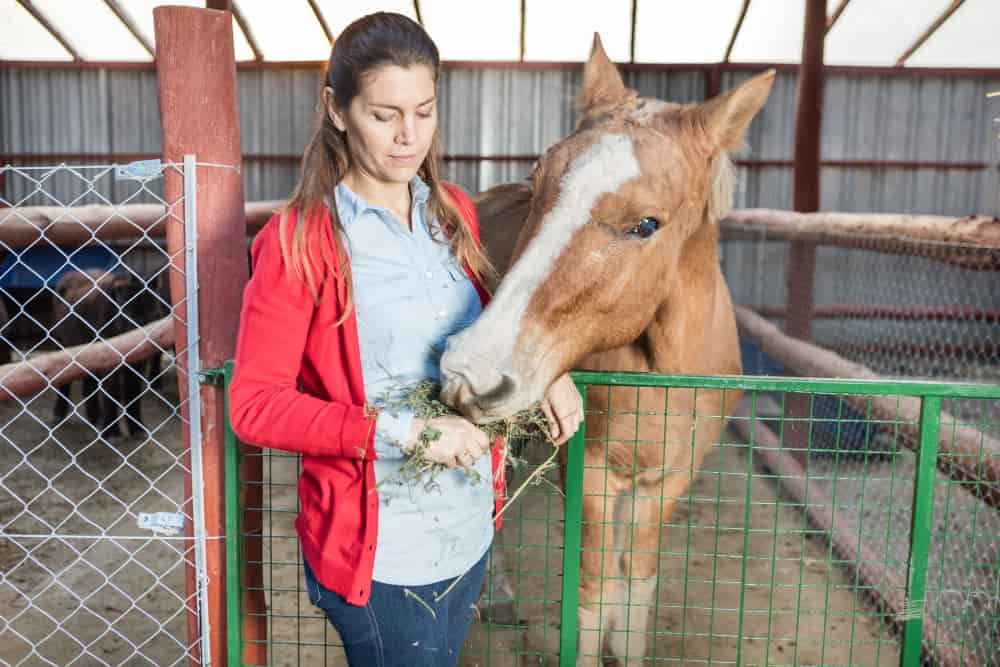Hay Choices for the Horsewoman: Finding the Perfect Feed for Your Equine Partner
There’s something uniquely powerful about the connection between a woman and her horse. It’s more than just companionship—it’s partnership, trust, and often, a lifelong bond. Whether you’re competing in dressage, enjoying long trail rides, or simply caring for your horse at home, one thing remains constant: the need to provide the best possible nutrition.
For horsewomen who take pride in caring for their equine partners, choosing the right hay isn’t just a matter of routine—it’s an extension of the love and responsibility you carry into the barn each day.

(Concentrated woman feeding the horse.)
Understanding Your Horse’s Nutritional Needs
Every horse is different. Their hay requirements depend on factors like age, activity level, breed, and any health issues they may have. But across the board, hay remains a foundational part of every horse’s diet—providing necessary fiber, nutrients, and energy.
When it comes to feeding performance horses, senior horses, or those with sensitivities, the stakes are even higher. That’s why understanding your hay choices is key to promoting long-term wellness and performance.
Popular Hay Options for Horsewomen
Here’s a breakdown of the most common hay types and how they can serve different needs:
1. Timothy Hay
Often the go-to choice for horse owners, Timothy hay is high in fiber and low in protein and calcium—making it ideal for adult horses with maintenance-level activity. It’s gentle on sensitive digestive systems and encourages consistent eating habits.
2. Orchard Grass Hay
This soft, leafy hay is a favorite among picky eaters. Orchard grass offers a balanced nutrient profile and is often mixed with alfalfa for an added boost of protein and energy.
3. Alfalfa Hay
If your mare is nursing, your gelding is in heavy training, or your horse is underweight, alfalfa hay can provide the high protein and calcium content needed to support recovery and performance. However, it’s best fed in moderation or combined with a grass hay like Timothy.
4. Teff Grass Hay
An increasingly popular low-sugar option, Teff hay is great for horses prone to insulin resistance or metabolic disorders. It supports weight control without sacrificing nutrition.
Matching Hay to Your Horse’s Lifestyle
Are you an active rider logging miles weekly? Or is your horse enjoying a more relaxed retirement in the pasture? The answer should guide your hay choice. Working horses may benefit from an orchard-alfalfa mix, while those with metabolic concerns do better on low-NSC hay varieties like Teff.
When in doubt, work with your vet or an equine nutritionist and request a hay analysis to ensure your hay has the proper protein, digestible energy, and mineral content.
Why Quality Hay Matters
As a horsewoman, your commitment to quality care is evident in every detail—from grooming routines to saddle fit. The hay you choose should be no different.
Dust-free, mold-free, and properly stored hay protects your horse from respiratory issues and digestive upset. At Ohana Farms, we’re proud to offer premium hay for horses, sourced with your standards in mind.
Final Thoughts: Feed with Purpose, Ride with Heart
You and your horse share a connection that’s built on care, trust, and time. Choosing the right hay is one of the simplest yet most meaningful ways to return the love and loyalty your horse gives you every day.
Whether you’re feeding a show horse or a retired trail partner, remember this: quality hay fuels quality moments.

